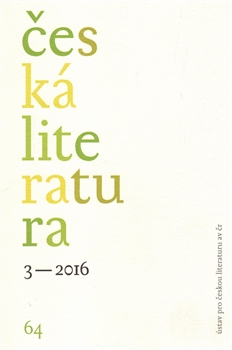Tradice, diskontinuita a etická dimenze literární historie
The tradition, discontinuity and ethical dimension of literary history
Author(s): Lukáš HolečekSubject(s): Language and Literature Studies, Studies of Literature, Czech Literature
Published by: AV ČR - Akademie věd České republiky - Ústav pro českou literaturu
Keywords: ethics; literary history; new historicism; hermeneutics; historiography; literary theory
Summary/Abstract: This article focuses on aspects of the theoretical issues involved in writing literary history. These reflections are based on the apparently acute conflict between historical analyses which promote discontinuity as an instrument and object of research (Michel Foucault) and concepts of literary history, which endeavour to base themselves on some kind of continuity. The author sees a way out from this stark theoretical contradiction represented by the terms ‘‘tradition’’ and ‘‘discontinuity’’ in a shift of attention towards the ethical aspects of literary history, finding arguments for seeking an ethical dimension in literary-history work, particularly in the hermeneutics of Hans-Georg Gadamer, Paul Ricoeur, a book by Polish researcher Ewa Domańska Historia egzystencjalna (2012) and the New Historicism of Stephen Greenblatt. Based on his analysis of the ethical aspects behind the ideas of these theorists, the author concludes that the essence of the past makes itself felt in its disturbing uncertainty, mutability, multiplicity and otherness. Any text from the past that becomes the subject of historical research is based on an ethical relationship involving the idea of debt. Literary history does not consist in the confirmation of continuity (e.g. national historiography), but quite the reverse in its constant querying and pursuit. Every text may be perceived as a resonating board (a ‘‘trace’’ of the past) that facilitates a confrontation with otherness. In this way attention might be focused on neglected phenomena, such as human emotions, desires, fear, pain and corporeality through marginal or forgotten texts, as records of the ‘‘movements’’ of living human beings who strove for something and who actually lived.
Journal: Česká literatura
- Issue Year: 64/2016
- Issue No: 3
- Page Range: 392-407
- Page Count: 16
- Language: Czech

